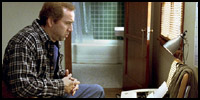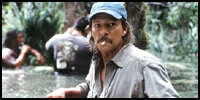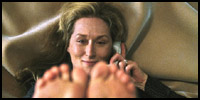
 |
|
Adaptation (2002) Cast: Nicolas Cage, Meryl Streep, Chris Cooper, Cara Seymour, Tilda Swinton, Brian Cox, Maggie Gyllenhaal, Judy Greer, Ron Livingston, Jay Tavare, Litefoot, Roger Willie, Stephen Tobolowsky, Catherine Keener, Spike Jonze, John Malkovich, John Cusack 2002 – 114 minutes Rated: Reviewed by Dustin Putman, December 26, 2002.  Well, it took twelve months, but a motion picture has finally been released in 2002 that is as audaciously original as 2001's "Donnie Darko," "Mulholland Drive," and "Moulin Rouge." "Adaptation," directed by Spike Jonze (1999's "Being John Malkovich") and written by Charlie Kaufman, is a mind-blowing experience in more ways than one, a film so daring, so unpredictable, so unconventionally brilliant, and so purely entertaining that it is a miracle it got made in the first place. For those who thought "Being John Malkovich" was "out-there," they haven't seen anything yet.
Well, it took twelve months, but a motion picture has finally been released in 2002 that is as audaciously original as 2001's "Donnie Darko," "Mulholland Drive," and "Moulin Rouge." "Adaptation," directed by Spike Jonze (1999's "Being John Malkovich") and written by Charlie Kaufman, is a mind-blowing experience in more ways than one, a film so daring, so unpredictable, so unconventionally brilliant, and so purely entertaining that it is a miracle it got made in the first place. For those who thought "Being John Malkovich" was "out-there," they haven't seen anything yet.
 Several years ago, screenwriter Charlie Kaufman was hired to adapt Susan Orlean's non-fiction book, "The Orchid Thief," into a film, only to discover that a faithful rendering would not be cinematic. The book, based on Orlean's article in New Yorker magazine, tells of John Laroche, a man so in love with the rare Orchid flower that he risked being arrested by taking them from the swamps of a national park in the Everglades. When Kaufman's attempts in adapting this tale failed, he found himself using the basis of Orlean's work as a jumping-off point to write a different sort of film that included Orlean and Kaufman himself as the central characters.
Several years ago, screenwriter Charlie Kaufman was hired to adapt Susan Orlean's non-fiction book, "The Orchid Thief," into a film, only to discover that a faithful rendering would not be cinematic. The book, based on Orlean's article in New Yorker magazine, tells of John Laroche, a man so in love with the rare Orchid flower that he risked being arrested by taking them from the swamps of a national park in the Everglades. When Kaufman's attempts in adapting this tale failed, he found himself using the basis of Orlean's work as a jumping-off point to write a different sort of film that included Orlean and Kaufman himself as the central characters.
 Director Spike Jonze's "Adaptation" is the wondrous result of Kaufman's struggle. Although far from the truth, in the screenwriter's mind Charlie Kaufman (Nicolas Cage) is overweight, balding, and painfully introverted. When he is commissioned by Valerie (Tilda Swinton) to adapt "The Orchid Thief," Charlie finds himself with a terrible predicament and a nightmarish case of writer's block. No matter how much he studies and digs within his source material, he cannot find a visual, interesting way to write the script. Not helping matters in Charlie's more assured twin brother, Donald (Nicolas Cage), who is writing his own screenplay: a conventional serial killer thriller called "The 3" that is immediately picked up by the studio currently in production on Charlie's "Being John Malkovich" (Jonze, John Malkovich, Catherine Keener, and John Cusack make cameos).
Director Spike Jonze's "Adaptation" is the wondrous result of Kaufman's struggle. Although far from the truth, in the screenwriter's mind Charlie Kaufman (Nicolas Cage) is overweight, balding, and painfully introverted. When he is commissioned by Valerie (Tilda Swinton) to adapt "The Orchid Thief," Charlie finds himself with a terrible predicament and a nightmarish case of writer's block. No matter how much he studies and digs within his source material, he cannot find a visual, interesting way to write the script. Not helping matters in Charlie's more assured twin brother, Donald (Nicolas Cage), who is writing his own screenplay: a conventional serial killer thriller called "The 3" that is immediately picked up by the studio currently in production on Charlie's "Being John Malkovich" (Jonze, John Malkovich, Catherine Keener, and John Cusack make cameos). In an underlying plot set three years earlier, Susan Orlean (Meryl Streep) has begun researching her article (and later her book) by interviewing John Laroche (Chris Cooper). Susan, who is married but unhappy, is drawn to Laroche's inspirational way of looking at Orchids, and realizes that she has never had anything in her own life that has inspired her in such a way. When Valerie proposes to option the film rights to her book, Susan is thrilled, not knowing that her unknown screenwriter, Charlie, has formed a heartbreaking crush on her.
In an underlying plot set three years earlier, Susan Orlean (Meryl Streep) has begun researching her article (and later her book) by interviewing John Laroche (Chris Cooper). Susan, who is married but unhappy, is drawn to Laroche's inspirational way of looking at Orchids, and realizes that she has never had anything in her own life that has inspired her in such a way. When Valerie proposes to option the film rights to her book, Susan is thrilled, not knowing that her unknown screenwriter, Charlie, has formed a heartbreaking crush on her. Believe it or not, this is merely the set-up for what is to follow in "Adaptation," a one-of-a-kind creation that twists and turns, building layer upon layer, time frame upon time frame, and fact within fiction, into a richly drawn, unforgettable tapestry about not letting life pass you by. More than that, even, screenwriter Kaufman has concocted one of the most truthful and searing portrayals of writing and moviemaking that has ever graced the silver screen. When Charlie sucks up his pride and agrees to attend a screenwriter seminar with author Robert McKee (Brian Cox), the result is both painfully honest and cathartic.
Believe it or not, this is merely the set-up for what is to follow in "Adaptation," a one-of-a-kind creation that twists and turns, building layer upon layer, time frame upon time frame, and fact within fiction, into a richly drawn, unforgettable tapestry about not letting life pass you by. More than that, even, screenwriter Kaufman has concocted one of the most truthful and searing portrayals of writing and moviemaking that has ever graced the silver screen. When Charlie sucks up his pride and agrees to attend a screenwriter seminar with author Robert McKee (Brian Cox), the result is both painfully honest and cathartic.
The screenplay, which is also credited to Donald Kaufman (a fictional creation of Charlie's), is startling in its multiple dimensions of the human beings on display and their inner struggles. As Charlie grapples with his writing assignment, he continuously strikes out with the women he has grown to care about because of his unrelenting shyness. Meanwhile, Susan Orlean's entire outlook on her life changes when she comes to the scary insight that she has never felt completely passionate about anything before. She yearns to have the feelings that John Laroche has, and is uncontrollably drawn to him because of this.  The trio of central performances are nothing short of incendiary. It has taken him seven years, but Nicolas Cage (2002's "Windtalkers") has finally found a marvelous role worthy of the promise made by 1995's "Leaving Las Vegas." Cage dually stars Charlie and Donald, and he is so good in his facial expressions and body language that you forget almost immediately they are both being played by the same actor, and accept them as two completely separate individuals. Making an indelible return to the big screen after a three-year hiatus, Meryl Streep (1998's "One True Thing") is phenomenally powerful and even sometimes extremely funny as Susan Orlean. In one felt swoop, Streep reminds the viewer of why she is considered one of the greatest actresses of all time. Finally, Chris Cooper (1999's "American Beauty") develops John Laroche's initial appearance of being a sort of backwoods redneck into a kind, intelligent, and charming man with more on his mind than meets the eye.
The trio of central performances are nothing short of incendiary. It has taken him seven years, but Nicolas Cage (2002's "Windtalkers") has finally found a marvelous role worthy of the promise made by 1995's "Leaving Las Vegas." Cage dually stars Charlie and Donald, and he is so good in his facial expressions and body language that you forget almost immediately they are both being played by the same actor, and accept them as two completely separate individuals. Making an indelible return to the big screen after a three-year hiatus, Meryl Streep (1998's "One True Thing") is phenomenally powerful and even sometimes extremely funny as Susan Orlean. In one felt swoop, Streep reminds the viewer of why she is considered one of the greatest actresses of all time. Finally, Chris Cooper (1999's "American Beauty") develops John Laroche's initial appearance of being a sort of backwoods redneck into a kind, intelligent, and charming man with more on his mind than meets the eye.
Surrounding Cage, Streep, and Cooper are a bevy of superlative supporting performances. Cara Seymour (2002's "Gangs of New York") is touching as Amelia, Charlie's would-be girlfriend who clearly would reciprocate Charlie's feelings for her if only he had the courage to express them. Judy Greer (2001's "The Wedding Planner"), as a diner waitress who relates to Charlie through her love of orchids; Maggie Gyllenhaal (2001's "Donnie Darko"), as Donald's vivacious girlfriend whom he meets on the set of "Being John Malkovich;" and Brian Cox (2002's "The Ring"), as brutally candid seminar speaker Robert McKee, are equally fabulous with only a handful of scenes each.  "Adaptation" is the rarest of cinematic treasures—a movie that engulfs the viewers in characters, stories, and complexities they have never before seen. Almost immediately beginning with a mesmerizing fast-motion depiction of the creation of the world since the dawn of time, and concluding with a corkscrew of a final act that is as surprising and unforeseen as it is devastating, director Spike Jonze once and for all places himself within an exclusive group of modern filmmakers as great as any working today. Endlessly enlightening, always fascinating, and nothing short of miraculous, to see "Adaptation" is to live, see, breathe, and feel in an entirely different way than any other motion picture released this year has offered.
"Adaptation" is the rarest of cinematic treasures—a movie that engulfs the viewers in characters, stories, and complexities they have never before seen. Almost immediately beginning with a mesmerizing fast-motion depiction of the creation of the world since the dawn of time, and concluding with a corkscrew of a final act that is as surprising and unforeseen as it is devastating, director Spike Jonze once and for all places himself within an exclusive group of modern filmmakers as great as any working today. Endlessly enlightening, always fascinating, and nothing short of miraculous, to see "Adaptation" is to live, see, breathe, and feel in an entirely different way than any other motion picture released this year has offered.
|
© 2002 by Dustin Putman |














